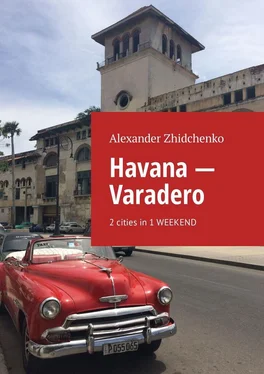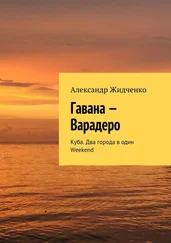Havana – Varadero
2 cities in 1 weekend
Alexander Zhidchenko
Havana-Varadero
Cuba. Two cities in one Weekend
© Alexander Zhidchenko, 2018
ISBN 978-5-4493-3092-5
Created with Ridero smart publishing system
The island of Liberty has always been and remains an attractive place for tourists and adventurers from all over the world. A kaleidoscope of national traditions, drowning in the innumerable colors of local everyday life, will not leave indifferent any guest. Perhaps someone here will find the meaning of something more distant, important, fateful than just a trip to an exotic country.
One weekend is very little to travel to this country. It would seem, well, an island and an island, what is there to see except the capital and countless beaches? Probably about Cuba is not so much to say, but it’s unlikely that anyone will dare to think, because history itself made this island and everything connected with it, legendary, filled with an extraordinary heroic destiny and opposites of being. It is both luxury and poverty, and drive, and calmness, and history, and modernity, and laziness, and hard work, and meeting and parting.
Let’s try to estimate the situation, however, that we were in Cuba not for a month or even a week, but only for a few days. What will we see in time? Where to go? In which adventure to participate? We will try to tell all this to those who are going to or have long been dreaming to go to Cuba, and who wants to spend time with maximum benefit.
So, we sit down at the computer and search for the cheapest ticket on the route Moscow-Havana-Moscow. Do not forget to book a place near the porthole a day before departure. On this route, regular low-costers do not fly yet, so you can do it for free. We are collecting a suitcase, and in the most secluded corner of the travel bag we put the passport and a little currency – dollars or euros – who like it better – the rate as a whole today is not very different when transferring to rubles. And in the way! For dollars, the solid take a commission of 10%, but the dollar against the ruble is more profitable than the euro. Therefore, there is a difference, but it is not very big.
By the way, before beginning your trip on this guidebook and on Cuba, I can not help but note that today there are many opportunities to organize your vacation from the very beginning to the very end. For example, an experienced tourist player in Cuba, such as Havanatur Russia, offers its services in the tourist services market, which is under the motto “Your expert on Cuba!”.
The life on the island has always been special. There is a certain isolation of the world, culture, traditions, the own development of all that on the continent is developing in a different way. Cuba is a fairly large country by the standards of the island states of the Caribbean, and the whole of Central America.
The country is located on one large homonymous island and a huge number of small islands around. Cuba is the 17th largest country in the world and is in this ranking between Newfoundland and Iceland. Its area is 105 806 sq. Km. And the territory of the whole country is a bit larger – 110 860 sq. Km. The population of this Latin American country fluctuates around 11 million people. Cuba is a unitary state and is divided into 16 provinces. The second largest island of the country – Juventud, which has about 86 thousand people, and whose main occupation is agriculture (citrus cultivation, livestock). By the way, it would be interesting to visit there in the future, and we must set such a goal for ourselves.
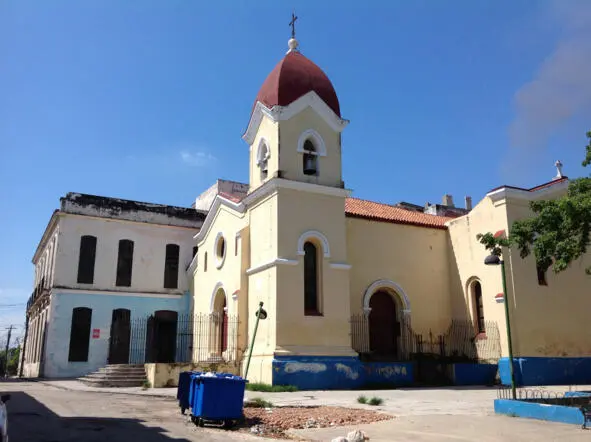
As an island nation, Cuba is surrounded on all sides by sea waters. This has had an impact on the mentality, culture, traditions, and even the course of historical events – this is the largest island in the Caribbean, which means that it has always been a tasty morsel for conquerors from all over the world. This also determined the complex course of Cuban history.
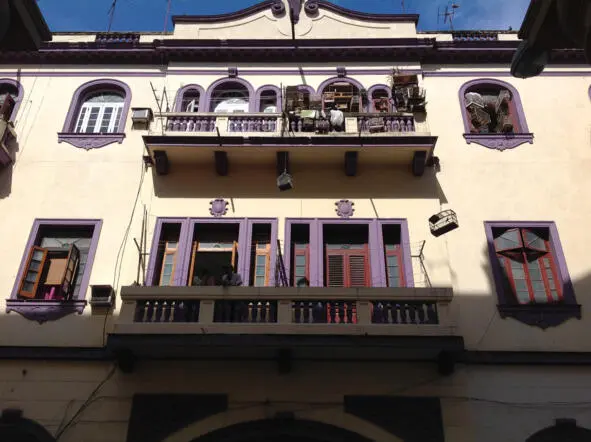
Historically, the first settlers of the island were the Indian tribes, who for many centuries of their development settled throughout the American continent. The first of the Europeans in this area was Christopher Columbus. It happened in 1492. And it began …!
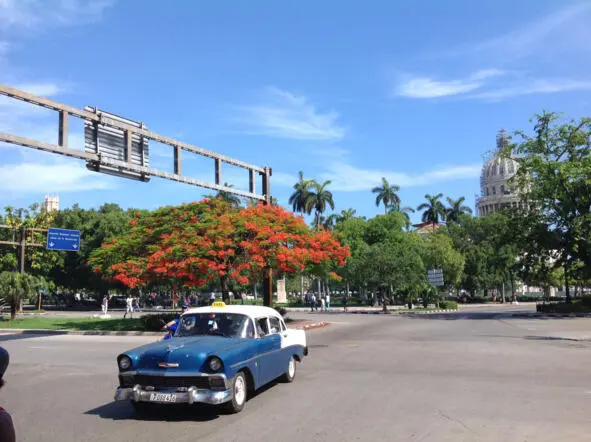
Already in 1511, the island was not at all well-intentioned, but with the goal of conquering the Spanish conquistador with a common name in Spain, almost full of the gripe of the world-famous artist, Diego Velázquez de Cuéllar. Initially, they founded Fort Baracoa here, and later Spanish settlements began to appear. The colonists from Europe quickly moved here. Here, tobacco and sugar production, as well as cattle breeding, developed.
Further, the Cuban history did not just go, it quickly rushed! So many centuries of calm and daily paradise violated the invading conquerors, and the history of these people became part of world history.
In 1762, during the war with Spain, the British seized Havana, Britain proclaimed freedom of trade, which contributed to the revitalization of the island’s economic life. A year later, when Havana was returned to Spain, the latter was forced to weaken the regime of trade monopoly in Cuba.
The liberation movement that began in the first half of the nineteenth century resulted in a ten-year war (1868—1878) against the colonialists, which, however, did not achieve its goal. ( http://www.roscuba.ru/allaboutcuba/history/)
The military operations ended with the peace treaty signed in 1878 in Sanhon. November 25, 1897 Spain gave Cuba autonomy, but the liberation movement on the island continued, and for help, the indigenous people turned to the United States. They fought for independence, although in reality, as a result of the declared American-Spanish war, they came under US rule.
Since 1925, the military dictatorship of Gerardo Machado has reigned in Cuba, and in 1940, as a result of the election, Batista came to power after losing the next election, but regained power as a result of the 1952 military coup. He proclaimed a dictatorship and began a regime of terror in the country.
On January 1, 1959, the Insurrectionary Army led by Fidel Castro overthrew Batista’s dictatorship. Cuba was proclaimed a socialist republic and began a friendship with the USSR, which was intended to protect the island from the United States. At the head of the pro-Soviet regime in Cuba were the brother of Fidel Castro Raul Castro and the Argentine Ernesto Che Guevara. Almost all enterprises were nationalized in the country, opposition was pursued, all citizens who collaborated with the US emigrated.
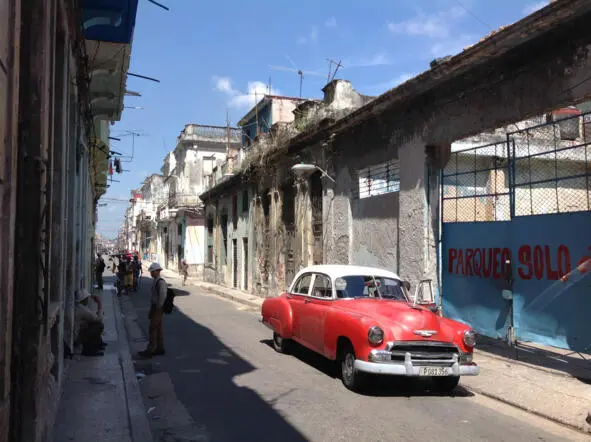
Briefly, the main milestones of the history of Cuba look like an eternal struggle for their own freedom, which went to her in a difficult way.
In this regard, in the cultural and historical space of Cuba you will constantly meet with monuments and memorable places dedicated to the Cuban revolution and its leaders.
The temperament of local residents accurately conveys the heat that reigns on the island of Liberty. I visited here, as they say, almost in peak season, in June, and I felt all the “delights” of the tropical climate on my own.
Читать дальше
